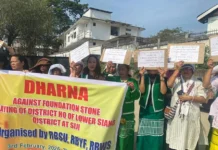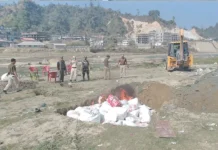RUPA, 11 Nov: The West Kameng KVK, in collaboration with the agriculture department, conducted an interactive programme for extension functionaries here on Friday to assess the problems of cultivation practices, use of excessive doses of pesticides, and dismal crop diversification adoption in the district.
The Rupa EAC and the Salari DTO witnessed the programme, which was attended by agriculture field assistants, horticulture field assistants, fishery assistants, and the block technology manager to discuss the potential for crop diversification in the area.
Fishery scientist Satyendra Kumar delivered a lecture on ‘Integrated fish farming system’, “with due importance of pond development in the area, in combination with agriculture/livestock farming, to recycle the waste materials, which may reduce cost of cultivation of farmers by 60 per cent with minimising pond fertilisation, as well as fish feeds,” the KVK informed in a release.
Kumar also enumerated “several manageable practices of fish and livestock farming,” it said.
Programme assistant (agriculture and allied) Sange Chom presented a brief on “the package and practices of tomatoes, with special emphasis on tomato varieties resistant to late blight disease, as this tomato disease has caused great economic losses to farmers of the area,” the release stated.
Plant protection scientist Mudang Tana spoke on integrated pest management, and enumerated various diseases of tomatoes and the ways to control them. Tana said that, based on “on-farm trial of different tomato varieties against the various tomato diseases in the KVK campus,” it has been found that “Arka Abhed is the only variety resistant to late blight disease.”
He asked the extension functionaries to advise the farmers to use this variety to minimise fungicidal usage in the area.
The KVK head (i/c) and the district agriculture officer said that this resistant tomato variety will be introduced in farmer’s fields as a trial to figure out “its sustainability on small plots by involving agriculture staffers for monitoring in Rupa and adjacent area, so that farmers can adopt this variety slowly and reduce usage of chemical in future,” it said.



